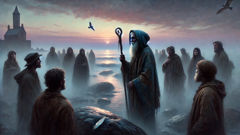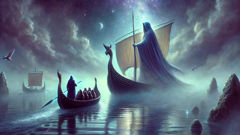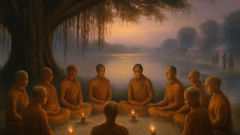Introduction
Where the land of Ireland yields to the restless tide, where headlands dissolve into sea mist and the horizon blurs into the unknown, stories have always risen from the spray. The windswept western shores, the ragged cliffs, and the silver-green fields beyond them are steeped in the voices of old—voices that speak of gods and guardians, of worlds hidden behind veils of fog and rain. Of all the tales carried by the Atlantic breeze, none is more captivating, more enduring, than the legend of Manannán mac Lir: the sea’s own son, keeper of ancient secrets, and master of the shifting borderlands between this world and the Otherworld.
To the people of ancient Éire, Manannán was more than a deity. He was the soul of the sea itself—sometimes generous, sometimes inscrutable, always powerful. His name was whispered by fishermen before a voyage and invoked by poets at dawn. Manannán’s dominion was not only the ocean’s rolling expanse but also the mysterious isles that appeared and vanished beyond mortal sight. He was the ferryman between worlds, the conjurer who cloaked himself in mists and took on many guises to test, protect, and occasionally trick the mortals of Ireland. His cloak shimmered like rain on water; his chariot rolled over the waves as if they were a paved road. To meet him was to encounter the unpredictable beauty and danger of the sea itself.
The legend that follows is woven from the oldest strands of Irish myth, colored by the wildness of the land and the indigo hush of deep water. It tells of a time when gods and mortals met in twilight places, when every tide brought tidings from another realm. It is a story of wisdom and cunning, of gifts and deceptions, and of the unbroken bond between Ireland and the ever-changing sea. Come, walk with Manannán along the strand where reality shimmers and the Otherworld beckons just beyond the surf.
The Shrouded Isle: Birth of a Sea God
Long before written words tamed Ireland’s wild stories, the name of Manannán mac Lir drifted like sea foam through the island’s oral traditions. It was said he was born on an isle hidden in perpetual mist—Emain Ablach, the Isle of Apples, far to the west where the sun falls into the sea. Some claimed his father was Lir, the embodiment of the ocean’s might; others believed Manannán’s origins were older still, rooted in the primal chaos before time’s count began.

From his earliest days, Manannán was marked by strangeness and subtle power. He could move through fog as easily as through daylight. The waves answered his whispers; the seals and seabirds carried messages for him. Mortals rarely glimpsed the child god, but those who did spoke of a wild-eyed boy who shimmered like sunlight on water and left no footprints in the sand. His laughter would roll across the coves and inlets, as haunting and beautiful as a mermaid’s song.
As he grew, Manannán learned the ways of both land and sea. He listened to the ancient stones along the coast, heard the wind’s secrets, and watched mortals navigate between hope and fear. He studied the currents and tides, not just of water, but of fate itself. Soon, he discovered his gift for disguise—a talent that would shape his destiny and the destinies of all who met him. With a whisper or a glance, he could change his form: a stag among the heather, a fisherman in a battered cap, a raven perched on a standing stone. Each shape allowed him to walk among mortals unseen, to judge their hearts without the weight of his divinity.
It was not long before the Tuatha Dé Danann—the great tribe of Irish gods—recognized his brilliance. They welcomed him into their councils, for his wisdom and humor brought light to their halls. Yet Manannán’s heart always yearned for the horizon, for the shifting boundaries where the familiar ended and the unknown began. He built his home on Emain Ablach, surrounding it with illusions so only those he invited could find it. There he kept his treasures: a self-navigating boat called Wave-Sweeper, a sword named Fragarach that answered only to truth, and a cloak that turned the wearer invisible. Each item was a lesson, a test, or a gift—depending on who sought it and why.
But it was his role as guardian of the Otherworld that set him apart. The Otherworld, in Irish myth, was not a place of death but of eternal youth, beauty, and joy—a realm of gods, fair folk, and mysteries beyond mortal understanding. Its borders touched Ireland in strange places: in hollow hills, beneath ancient lakes, and out beyond the last island where the sea turns silver. Manannán stood watch at these borders, ferrying souls between worlds, protecting sacred secrets, and ensuring that mortals only glimpsed what they were meant to see. Through his riddles and illusions, he taught humility and reverence for the unknown.
Gifts and Guises: The Trickster’s Wisdom
As Manannán matured, his mastery over illusion and transformation grew ever more profound. He became a shape-shifter without equal, a trickster whose lessons often arrived cloaked in riddles or disguised as hardship. The mortals of Ireland, from high kings to humble crofters, all knew tales of Manannán’s interventions—some joyful, some bewildering, all unforgettable.

One bitter winter, when the land lay under frost and the sea’s bounty seemed lost, the people of a small fishing village on the western coast gathered on the strand at dawn. Their nets had come up empty for weeks. Hunger gnawed at their bones, and their hope ebbed with the tide. That morning, they found a stranger standing at the water’s edge—a gaunt old man with a threadbare cloak and a battered staff. He spoke little but smiled with an uncanny brightness. When they offered him what little food they had left, he thanked them with a nod and vanished into the mist. The next morning, the sea was alive with fish; their nets overflowed. Some swore they heard laughter carried on the breeze. Others noticed a shimmering feather left behind on a stone—a token, they said, from Manannán himself.
Not all his lessons were so gentle. There was the tale of Fionn mac Cumhaill, the great warrior-leader of the Fianna. Eager for glory, Fionn sought out Manannán to ask for a magical weapon. When he reached the hidden isle, Manannán greeted him not as a god but as a humble ferryman, offering only riddles and confusing directions. Fionn, impatient, tried to force his way through the illusions—only to find himself walking in circles, lost in a maze of shifting fog. It was only when Fionn paused, set aside his pride, and listened to the whispers of the wind that he saw through Manannán’s tricks. In reward for his newfound humility, Manannán gifted him not a weapon, but a lesson: wisdom and patience could cut through confusion more surely than any sword.
Manannán’s own treasures became legendary. The Wave-Sweeper sailed wherever its captain wished, needing neither sail nor oar. Fragarach, the Answerer, compelled truth from any who faced its point. His cloak made the wearer invisible to both friend and foe, and his silver branch was hung with bells whose music soothed all sorrow. Yet he gave these gifts only to those who passed his tests—never as a bribe or out of pity, but as recognition of character. To some, he appeared as a beggar; to others, a king in splendor. None could say for certain what he truly looked like, for his power lay not just in illusion but in knowing what guise each seeker most needed to see.
Through these encounters, Manannán taught mortals that wisdom is born from uncertainty, that humility opens doors pride cannot. His laughter could be mocking or kind, but it always pointed toward deeper understanding. By moving between shapes and identities, he reminded Ireland that the world is never quite as it appears—and that the greatest truths are often hidden in plain sight.
Guardian at the Gates: The Otherworld Beckons
Manannán’s greatest responsibility lay in his role as warden between realms. The Otherworld was not a distant afterlife, but a living presence just beyond mortal sight—a domain of unending youth, joy, and possibility. Its meadows were always green, its apples never withered, and music drifted endlessly through twilight groves. Yet its doors were dangerous: for mortals who entered unbidden or unprepared, its beauty could turn to longing and loss.

Only Manannán knew all the shifting pathways. He guarded the hidden crossings: the hollow hills of the Sidhe, the sacred lakes where islands emerged only by moonlight, and the silver mists that wrapped Emain Ablach. Those who sought entry—heroes, poets, grieving lovers—often found Manannán waiting in one form or another. He might appear as a kindly ferryman, offering passage if the price was right; as a wild-eyed youth, daring them to answer impossible riddles; or as a silent shadow who watched but did not speak.
Among the most famous seekers was Bran mac Febal, a nobleman haunted by dreams of otherworldly music. One evening, as Bran wandered alone near the sea, a woman in radiant clothes appeared, holding a silver branch hung with bells. She sang of Emain Ablach and urged him to journey west beyond the horizon. Bran gathered a band of companions and set out across the water. Mists rose around their boat, obscuring all sense of time and space.
On the third night, a strange vessel appeared beside them—its sail shimmering with moonlight, its prow carved in the likeness of a swan. At its helm stood Manannán, cloaked in colors no human eye could name. He greeted Bran warmly and taught him the way to the Otherworld, warning that joy and sorrow are two sides of the same coin. Bran’s journey unfolded as both marvel and warning: though he tasted immortal delights, he could never return unchanged. For when he set foot on Irish soil again, centuries had passed, and all he knew was dust. Manannán’s guidance was both gift and challenge—a reminder that the boundaries between worlds are as fragile as seafoam.
Throughout these tales, Manannán’s wisdom shone brightest not in power, but in mercy and restraint. He protected mortals from dangers they could not understand, guided them through sorrow and joy alike, and never revealed more than they were ready to see. In his company, seekers learned that the Otherworld’s greatest gift was not escape, but insight—a glimpse into the eternal mystery woven through all things.
Conclusion
Manannán mac Lir remains one of Ireland’s most enduring mythic figures because he embodies the meeting point between certainty and wonder. His presence is felt wherever boundaries blur—between land and sea, mortal and divine, seen and unseen. Through his gifts and guises, he invites all who listen to look beyond appearances, to approach the unknown with curiosity and humility. The lessons he offers are never simple answers but opportunities to grow in wisdom: to embrace change, to trust in the journey, and to honor the mysteries that give life its depth.
Even now, when the Atlantic fog rolls in over ancient stones and seaweed tangles at your feet, there are those who sense Manannán’s laughter on the wind. They leave offerings of bread or flowers on windswept shores, whispering hopes or thanks into the brine. For as long as Ireland dreams by the restless tide, the legend of Manannán mac Lir will continue—guiding seekers, guarding secrets, and reminding all that the greatest treasures lie just beyond the horizon.













